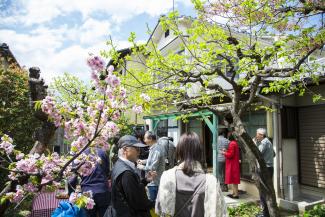
NPO ANEWAL GALLERY
Kyoto Kinugasa Art Residence for Community (KKARC), a non-profit international art residency program run by NPO ANWEAL GALLERY, welcomes artists, writers, curators, researchers, and educators worldwide. The KKARC program is founded on the principles of personal exploration, professional development, co-living, and collaboration. Located in the Kinugasa district of Kyoto, a city where the spirit of thousand years of tradition, culture, and abundant nature has remained firmly intact, the KKARC program focuses on projects exploring the interplay of history, nature, and urban environment with the local craftspeople and artisans, as well as the local residents in this quiet and picturesque atmosphere.
The Kinugasa district covers the southern foot of Kinugasa mountain and is surrounded by the UNESCO world heritage sites such as Kinkaku-ji temple, Ryoan-ji temple, and Ninna-ji temple. Cited in classical waka poetry from the Heian period, the Kinugasa neighborhood was known as a village of artists, especially Nihonga (Japanese-style) painters. This atmosphere has lent inspiration and passion to local artists and craftspeople. The Kinugasa area has also developed as a site for educational research institutions led by Ritsumeikan University. Taking in old and new diverse perspectives, the KKARC program supports the resident artist to develop projects by enabling meaningful connections in this environment.
The program is not strictly designed for self-project/self-productions but encourages residents to interact with people and professional creatives in the local community in order to go beyond their discipline with a sense of curiosity, open-mindedness, and sensitivity for broadening viewpoints and contexts.
The KKARC program aims to give resident artists a unique experience that will enrich their field of practice, developing to the next stage of their lifelong artistic expression.
The KKARC house converted our garage space into a workspace for one artist.
It does not include a workspace for dance/music rehearsals, but, ANEWEAL GALLERY can assist residents in finding one upon request in advance.
The KKARC house is a private residence with two tatami-mat rooms designated for common use (library, music room, dining, or meeting). The two bedrooms available for resident artists are located on the second floor, measures 12.5m2, two windows, clothing rack, writing desk, mirror, air-conditioner and twin bed/Futon. Another twin bed can be added if needed. A bicycle is also available for convenient travel around town.
The house has a fully equipped kitchen, shower room, washroom, washing machine to share, and WIFI connection. There is a large garden with a pond with killifish, as well as cherry, plum, and persimmon trees to enjoy.
NPO ANEWAL Gallery was founded in 2004 by a team of voluntary artists, art directors, photographers, and creators. ANEWAL Gallery does not only offer an exhibition space, but it also aims to organize events that bring new values and new ways of thinking to our community. They aim to connect artists and creators with the local people and the various public spaces, such as abandoned buildings, machiya townhouses, roji alleys, and underpasses that are typical to the townscape of Kyoto. Utilizing the power of culture in this old-new community in Kyoto, they make efforts to solve social and regional problems and broaden our perspectives.



